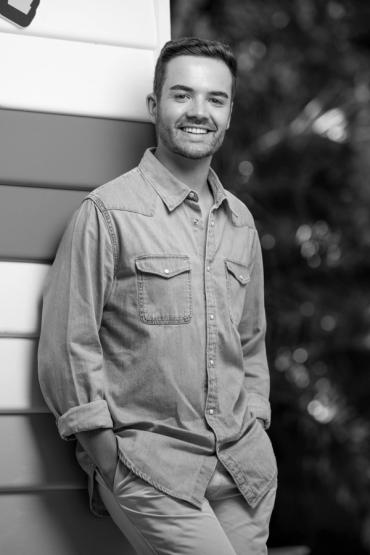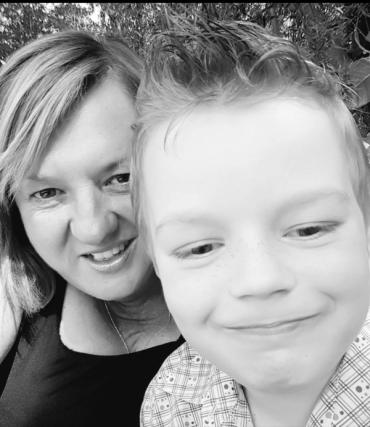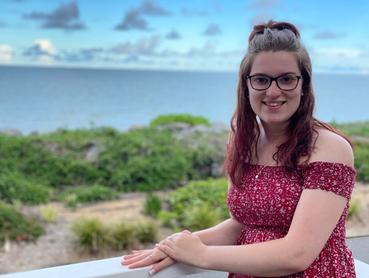My Story, my career path - Tamara Trinder-Scacco
Tamara is the Community Engagement Manager at Deaf Children Australia. She shares her story about living with hearing loss and how it's helped shape her journey.

Tell us about your diagnosis as a child?
I was diagnosed at two years old with borderline profound hearing loss. There were no newborn hearing screening tests available in the 1970's like we have now. An appointment with National Acoustic Laboratories (NAL) - now known as Hearing Australia. It was situated in the city on Spring street, appointments were far and few unlike now where appointments are frequent, and offices are scattered in different parts of Melbourne and Regional Victoria.
My mother was suspicious much earlier when I was a baby, however it was initially dismissed by our family GP because I was clever at responding when they were making noise behind my back. I was able to feel the wind against the back of my head when they were clapping very closely behind me, I was also able to hear a very faint sound in the midst of silence which alerted me to look around wondering what was going on.
If and what age were you fitted with a hearing aid or cochlear implant and what was that like?
I was fitted with a hearing aid when I was 2.5 years old. I can say I absolutely hated wearing hearing aids. There were not like what we have now. They wear big chunky box strapped in the front of my chest connected with wires which is connected to the ear moulds. They were fitted into my ears. The sounds were dreadful. I could hear every single background noise including the sounds of my clothing rubbing against the boxy hearing aids. All day I would hear the shuffling and rubbing sounds as well as the winds blowing. It drove me crazy and gave me headaches.
Eventually the size of the hearing aids improved over time, and I was able to wear them behind my ears. The appearance and the sounds were no better but at least it was less noticeable. I continue to hate them because of the dreadful sounds. I continually kept taking them off and at times I would throw them away all different places including in the toilet, out of the moving car windows or bury them in the sand pit. Professionals and my parents were always at war with me. Only if they understood the quality of the sounds were atrocious.
Technology have improved but it is not the same as "normal" sounds and never will be. It does help me to hear when I am lipreading. If I have my head turned away, I may be lucky to pick up one or two words in a conversation.
Are you oral and if so, what was your experience like learning spoken language?
I was raised as an oral deaf person because professionals told my parents it was best to learn how to speak and not to introduce sign language (Signed English) because it would impede my speech. From a very early age to when I was about 18, I had access to elocution every Saturday morning at 8am and Speech Therapy one day week during school hours. The lady who provided elocution did not charge my parents a fee, which I am always forever grateful for her to give up one hour of her time every Saturday morning to ensure I get the best speech.
However, just because I was able to speak quite well, it did not mean I was able to hear everything and clearly. Best way to describe how I hear sounds without lipreading, is when you are listening to the radio, and it is distorted with bad radio frequency connection. The sounds is extremely distorted where you really have to pay attention to try and listen to make sense of it with very little success. This is how I hear with my high frequencies' sounds. I am unable to hear the low frequency sounds. I do not do well understanding male voices. All my early years I missed out at family events, school, and friends because I didn't have access to all sounds.
Looking back I realised I put up a front to try and fit in but I was really struggling and was feeling very isolated. I knew I was different and was never fully included.
Do you use Auslan, why did you decide to learn and at what age?
When I was 13, by accident during swimming training with a local club, one deaf person approached my father and asked if I would be interested in joining a deaf swimming club in Melbourne. This was the turning point which shaped my life for the better. I was introduced to so many deaf people who use Auslan. Not long after, I joined a Deaf netball and basketball club during my teen years, expanded my circle of deaf friends and made some beautiful friendships. Over the years I learned Auslan and it was the best thing that ever happened to me because I was able to have access to full information. For the first time I felt I didn't miss out and I had a sense of belonging.
After I finished year 12, I went to RMIT to study Youth services, I had access to Auslan interpreters in classes. It was an eye opener and I couldn't believe how much information I was gaining compared to my high school years where I did not have access to an Auslan interpreter.
How did you communicate within your family and amongst friends?
Growing up I communicated orally with my family and hearing friends. When my eldest daughter was born and diagnosed she had a hearing loss. My sister enrolled in a Diploma of Auslan which went for over period of 2 years. This really helped my family and strengthened my relationship with my sister - we got much closer because of it. Afterwards my niece and her husband started to learn Auslan through short courses and my eldest sister started to learn Auslan at home thanks to my NDIS funding. Every little bit makes a difference in our lives when we can communicate in Auslan with our family.
I was also fortunate I had hearing friends who learned Auslan and one even went on and completed her Diploma of Auslan. My daughter's group of friends learned Auslan during the COVID lockdowns online. It helped them to understand my daughter and be more aware of her communication needs.
Tell us about going to school - what was that like? What were the worries you had that you remember?
I was the only person at school with a hearing loss. I felt and I was treated different. Despite I had some friends, I was always the outsider and was never fully included. I was never invited to school parties etc. A new friendship was formed in Year 11 and 12 when another student was transferred to my school. She really went out of her way to include me. It made my days more bearable.
I did not have access to an Auslan interpreter through out my primary or secondary years. I had a note taker during secondary and it did help me but it was not fully accessible. I still missed out a significant amount of learning.
I also had accessed to a Visiting Teacher 2-3 times a week, I had an awesome Teacher of the Deaf, Jackie Clark. If it wasn't for her I would not be where I am today.
I am forever indebt for my parents who really did tried their best and they thought they were doing the best for my education based on various professional opinions and advice, and they had to go with available resources at the time. My parents had to lobby and advocate for me constantly to ensure during year 12, I had access to captions in all of the VHS tapes, the whole school had wooden floor boards and dad managed to lobby to ensure every class room was installed with carpets to reduce the echo acoustics.
I am not angry with my parent because I know they really tried and did their best with available biased professional resources.
And tell us about going to Uni or TAFE - what was that like?
It was an eye opener for me. I was able to access to Auslan interpreters and a notetaker. I enjoyed participating in classes and group work because I was able to understand what was being said, I was being included etc. Yes, there was a lot of issues with the quality of Auslan interpreters as often lower quality interpreters were allocated because it was cheaper to pay them. Other deaf students and I had to advocate and demand for better quality interpreters throughout the years of studying at RMIT. Sometimes we did get what we needed but not always. Having poor quality interpreters did have an impact on our learning and we had to work harder all the time.
What influenced your career choices?
Earlier years after I finished schooling, I had no real sense of career directions. This was because I was not exposed to what was available out in the real world. I was ushered to do cooking because I was good at it, however it did not mean I enjoyed it. I ended up working in hospitality for a few years until I realised it was not my career choice.
Being a Police Officer was something I wanted to do as I loved the idea of doing community policing and homicide. I applied to join the police force, only to be knocked back because of my deafness. It did dampened my spirit and motivation for awhile.
It was not until a couple of older deaf peers told me I would be good at working and supporting people with disabilities. This was the beginning of my journey studying and working in disability sector. Over the years, I looked back and realised I wanted to be like my father who was an excellent business man, but also very passionate advocating for deaf rights. There was a light bulb moment, I wanted to work in management/leadership sector for disability organisation.
Do you love what you do?
I love being a Support Coordinator Team Leader. I love a new challenge and I am always learning everyday. I am very fortunate I have a couple of awesome mentors at DCA who is helping me pave my way to work in the executive leadership field. I know I have a lot to learn, but I am excited and so eager to bring my skills and expertise into the team.
What are your main challenges?
My previous challenges were self doubts because it was instilled in me I was not good enough to be a manager. Experiencing discrimination, audism and silencing has made me more resilience. I continued to remain loyal and be true to myself really turned my life around for the better. Stars aligned when I was linked with my two mentors and they have shaped me to who I am today.
And how did you overcome them?
I am very fortunately I have wonderful mentors who have the time and patience to guide and direct me to achieve where I want to be. This has allowed me to believe in myself it is okay to make mistakes and learn from it.
What key message would you give parents who are starting out their journey with a deaf/hard of hearing child?
Be open to the idea of providing different options of languages (Auslan, Bilingual, Spoken language). Do not limit to one. This will open up their world and your child will figure out their preferred pathway when they are in youth years and early 20s.
Provide them with as much as information as you can while their brain is still absorbing languages and information. The sky is the limit.
Do not let anyone tell you or your deaf child they cannot be whatever they want to be. Always support their dreams. Obstacles do get in the way however at times we need to take a detour to reach their goals.
Be around positive and unbiased deaf role models - they are the influencers who will shape your child's life.



